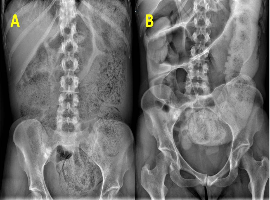Matteo Guarino1*, Gabriele Anania2, Giovanni Ciancio3, Giacomo Caio1 and Roberto De Giorgio1
1Department of Translational Medicine, University of Ferrara, Ferrara, Italy
2Department of Medical Sciences, Section of General and Thoracic Surgery, University of Ferrara, Italy
3Department of Medical Sciences, Section of Rheumatology, University of Ferrara and Sant'Anna University-Hospital, Italy
*Corresponding author: Matteo Guarino, Department of Translational Medicine, University of Ferrara, Ferrara, Italy, Tel: +390532236819; E-mail: grnmtt@unife.it
Received: February 28, 2021; Accepted: March 09, 2021; Published: March 28, 2021
Citation: Matteo Guarino, Gabriele Anania, Giovanni Ciancio, et al. Neostigmine-Induced Reversal of Faecal Impaction and Severe Constipation in a Young Patient with Systemic Sclerosis. Clin Image Case Rep J. 2021; 3(3): 152.


